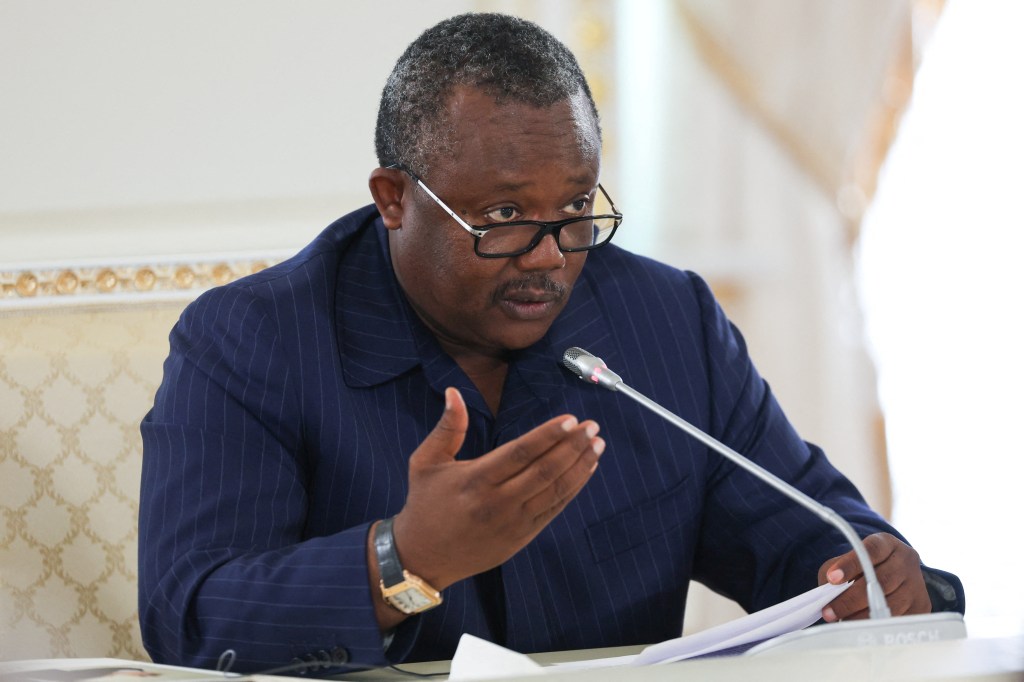New York, August 29, 2024—Amid political tension in Guinea-Bissau following President Umaro Sissoco Embaló’s dissolution of parliament in December, it was only natural for radio journalist Ussumane Mané to ask the West African leader a question that was on everyone’s lips: will there be a presidential election this year?
Embaló, a former army general who came to power on February 27, 2020, following a disputed poll, responded by swearing at Mané during the July 13 news conference at the airport in the capital Bissau.
“He blew up, told me, ‘Go fuck yourself,’” Mané, who works with the Catholic-owned Radio Sol Mansi, told CPJ. “I was shocked. I didn’t say anything else.”
The incident is emblematic of the fractious relationship between Embaló’s administration and the press, with differences mounting since the president’s dismissal of parliament following clashes that he said were an attempted coup.
Since July, at least 16 journalists have been obstructed, expelled, or even attacked by police and government officials while trying to report the news.
“President Embaló’s outbursts and threats against the media, coupled with police violence against journalists, paint a bleak picture of press freedom ahead of Guinea-Bissau’s legislative elections in November,” said CPJ Africa Program Coordinator Muthoki Mumo, in Nairobi. “Authorities must investigate attacks on the press and ensure the media can do their jobs freely.”
Ruling by decree, Embaló plans to hold legislative elections in November, ignoring calls by political parties for presidential elections in 2024, which analysts say are constitutionally required 90 days before his term expires on February 27, 2025.
Other notable incidents include:
- On July 14, the local journalists’ union Sinjotecs called on the media to boycott coverage of the president, describing “disrespect” and “systematic insults” as “recurrent in Embaló’s public communications.” In response, the president announced his own boycott of the journalists’ union and called on the Attorney General to look into Sinjotecs.
- On July 31, two journalists were hit by a police vehicle while covering a teachers’ protest in Bissau. Radio Popular reporter Nguoissan Monteiro told CPJ that the vehicle hit her and threw her several meters. Radio Capital FM reporter Djuma Colubali told CPJ that a police vehicle drove over her foot, and an officer beat her with a baton from behind while she was filming with a tripod on a sidewalk. She fainted. CPJ could not determine whether the same vehicle was involved in both incidents.
- On August 5, Embaló held a three-hour meeting with journalists. He defended his press freedom record. “In the PALOP [Portuguese-speaking African] countries, Guinea-Bissau is the only country where a journalist insults the President of the Republic and goes to sleep without anything happening to him. We see countries where journalists are shot in the streets,” Embaló was quoted as saying.
- On August 13, police barred more than a dozen journalists from covering the arrival of Braima Camará, president of Embaló’s MADEM-G15 party, at Bissau international airport. Camará was a key ally of the president who recently withdrew his support. Two of those present, Aguinaldo Ampa of O Democrata newspaper and Djariatu Baldé of Radio Jovem told CPJ that the police blocked about 13 reporters from a VIP reception center that was usually accessible to the press, and then ordered the journalists to leave the passenger arrivals area as well as a roundabout near the airport where they had retreated to.
- On August 22, an aide with the health ministry expelled Indira Baldé, president of the journalists’ union who works for the Portuguese public broadcaster RTP, from its news conference, citing a “superior order from the presidency to bar me from reporting on anything related to the government,” Baldé told CPJ.
Presidential spokesperson Ndira Tavares told CPJ that she was confident an incident like Embaló swearing at Mané would not happen again and the presidency was “committed to maintaining an open and respectful dialogue” with the media. She described the president’s August 5 meeting with journalists as “very productive and participative” but did not comment on Baldé expulsion from the health ministry news conference.
José Carlos Macedo Monteiro, Secretary of State for Public Order, told CPJ “that those abroad don’t know what happens in the country and should not talk about what they don’t know,” without providing further details.
The Ministry of Interior did not respond to CPJ’s emailed request for comment.
